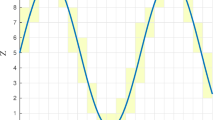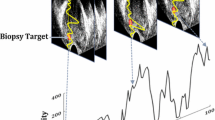Abstract
Ultrasound diagnosis and therapy is typically protocol driven but often criticized for requiring highly-skilled sonographers. However there is a shortage of highly trained sonographers worldwide, which is limiting the wider adoption of this cost-effective technology. The challenge therefore is to make the technology easier to use. We consider this problem in this paper. Our approach combines simple standardized clinical US scanning protocols (defined by our clinical partners) with machine learning driven image analysis solutions to enable a non-expert to perform ultrasound-based diagnostic tasks with minimal training. Motivated by recent work on dynamic texture analysis within the computer vision community, we have developed, and evaluated on clinical data, a framework that given a training set of Ultrasound Sweep Videos (USV), models the temporal evolution of objects of interest as a kernel dynamic texture which can form the basis of a metric for detecting structures of interest in new unseen videos. We describe the full original method, and demonstrate that it outperforms a simpler recently proposed approach on phantom data, and is significantly superior in performance on real clinical data.
Access this chapter
Tax calculation will be finalised at checkout
Purchases are for personal use only
Preview
Unable to display preview. Download preview PDF.
Similar content being viewed by others
References
Chykeyuk, K., Yaqub, M., Noble, J.A.: Class-specific regression random forest for accurate extraction of standard planes from 3d echocardiography. In: Menze, B., Langs, G., Montillo, A., Kelm, M., Müller, H., Tu, Z. (eds.) MCV 2013. LNCS, vol. 8331, pp. 53–62. Springer, Heidelberg (2013)
Kwitt, R., Vasconcelos, N., Razzaque, S., Aylward, S.: Localizing target structures in ultrasound video - a phantom study. Medical Image Analysis 17(7) (2013)
Kovesi, P.: Symmetry and asymmetry from local phase. In: Tenth Australian Joint Conference on Artificial Intelligence, pp. 185–190. Citeseer (1997)
Felsberg, M., Sommer, G.: The monogenic signal. IEEE Transactions on Signal Processing 49(12), 3136–3144 (2001)
Doretto, G., Chiuso, A., Wu, Y.N., Soatto, S.: Dynamic textures. International Journal of Computer Vision 51(2), 91–109 (2003)
Chan, A.B., Vasconcelos, N.: Classifying video with kernel dynamic textures. In: CVPR, pp. 1–6. IEEE (2007)
Vishwanathan, S.V., Smola, A.J., Vidal, R.: Binet-cauchy kernels on dynamical systems and its application to the analysis of dynamic scenes. Int. J. Comput. Vision 73(1), 95–119 (2007)
Chaudhry, R., Vidal, R.: Recognition of visual dynamical processes: Theory, kernels and experimental evaluation. Department of Computer Science, John Hopkins University, Technical Report, 09–01 (2009)
Chaudhry, R., Ravichandran, A., Hager, G., Vidal, R.: Histograms of oriented optical flow and binet-cauchy kernels on nonlinear dynamical systems for the recognition of human actions. In: CVPR 2009, pp. 1932–1939. IEEE (2009)
Author information
Authors and Affiliations
Editor information
Editors and Affiliations
Rights and permissions
Copyright information
© 2014 Springer International Publishing Switzerland
About this paper
Cite this paper
Maraci, M.A., Napolitano, R., Papageorghiou, A., Noble, J.A. (2014). Searching for Structures of Interest in an Ultrasound Video Sequence. In: Wu, G., Zhang, D., Zhou, L. (eds) Machine Learning in Medical Imaging. MLMI 2014. Lecture Notes in Computer Science, vol 8679. Springer, Cham. https://doi.org/10.1007/978-3-319-10581-9_17
Download citation
DOI: https://doi.org/10.1007/978-3-319-10581-9_17
Publisher Name: Springer, Cham
Print ISBN: 978-3-319-10580-2
Online ISBN: 978-3-319-10581-9
eBook Packages: Computer ScienceComputer Science (R0)




